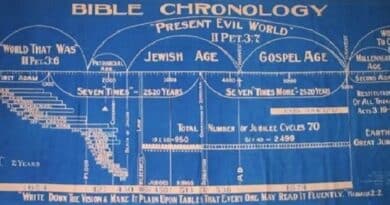Interpretations of Romans 13 – Facts and Consequences
In the year 1981, the leadership of the Watch Tower Society has felt the need to come up with a public explanation for some of its glaring changes in doctrine. In the December 1, 1981 issue of the Watchtower magazine, the view was advanced that certain mistakes that the Society has made in the past were not really mistakes at all but should be considered “steps” toward proper understanding. By putting forth faulty views in the past, the Society was “tacking” toward truth.
One of the examples expressly mentioned in the Watchtower was changes in the understanding of Romans 13:1-7. It stated that the “early Bible Students rightly understood that the ‘higher powers’ or ‘superior authorities’ were the governmental rulers of this world.” 1 But their view had a weak point, the Society now contended. On the basis of that View “they concluded that if a Christian were drafted in time of war, he would have to serve in the army, don a uniform and go off into battle.” 2 Rectifying this obvious misunderstanding, the recent Watchtower article said, “For a time, God’s people held to this viewpoint” that Romans 13 dealt with Jehovah God and Christ Jesus. 3 This change came in 1929 4 and was, the Watchtower now claims, beneficial for the Witnesses “during the troublous years of World War II.” 5 Yet in 1962, there was a switch in thinking back to the view held before 1929. Once again the “higher powers” were identified as the “secular rulers” of this world. The Society emphatically stresses, however, that a new element has been added to the original understanding, and this new element makes the wrong position held between 1929 and 1962 part of “progressive enlightenment.”
Present Watch Tower doctrine teaches that unlike the early Bible Students, Jehovah’s Witnesses realize that subjection to worldly rulers has a limit:
The claim of gradual enlightenment about Romans 13 was brought out even more pointedly in 1972:
All this sounds quite reasonable until the hard facts are considered. Unfortunately, the Watchtower’s presentation of the matter is not historically accurate. While it is true that the early Bible Students “rightly understood” that the “higher powers” of Romans 13:1 “were the governmental rulers of this world,” it is not true that they held that these rulers must be given unqualified obedience and that their view therefore needed correction. It is not true that modern Witnesses have arrived at some understanding about the “higher powers” that the early Bible Students did not know. In fact “relative subjection” to worldly rulers is not a new teaching of the Witness community as the Watch Tower Society would have us believe. Yet the implications of the fact that there was no justification for the change in doctrine that the Society carried out in 1929 are so great that it becomes easy to see why Watch Tower leaders suppress the truth today.
Let us examine the facts. Charles Taze Russell, the renouned founder and first president of the Watch Tower Society, clearly and consistently taught that subjection to the “higher powers” should be relative. In Volume I of Studies in the Scriptures (1886), Russell explained how Jesus and the apostles felt about the matter, thus providing the Christian position. He stated:
Since the Studies in the Scriptures were normative in the Bible Student community, the view contained therein may be taken as representative for the whole movement. That they understood the relativity of subjection to the “higher powers” is made even plainer in the article “Obeying God Rather Than Men” as published in The Watch Tower of January 15, 1916. Russell, the editor of The Watch Tower and the author of the article in question, stated:
Thus the early Bible Students understood “the principle of relative subjection” just as much as do Jehovah’s Witnesses since 1962. When the Society reverted to the original position held prior to 1929, they surely had not been “tacking” toward the correct viewpoint as they now officially claim. The naked facts are that in 1929 their leaders rejected the correct understanding of Romans 13 in favour of a totally false and uncalled-for viewpoint.
In 1962 they returned to the original, completely correct understanding of the matter. But , in order not to upset intelligent rank and file members, the Society cleverly invented the view that they had arrived at a much fuller understanding than had the earlier Bible Students. That way the faulty view published in 1929 could be justified as a “step” in the right direction. As we have seen, though, this explanation simply does not hold true!
But is it not true that the early Bible Students, when drafted in time of war, actually used Romans 13 to excuse their service in the army? Even if it were so, it would not excuse the rejection of the correct understanding of Romans 13 that was officially held by the Bible Student community. If some went to war, that could not be blamed on the official Watch Tower interpretation of Romans 13, which clearly stated that God’s law were superior to man’s and that subjection to earthly rulers, therefore, had limits. The early Bible Students’ view of Romans 13 was no more respnsible for the fact that some Bible Students participated in war than is the post-1962 view of Jehova’s Witnesses for the fact that an occasional Witness joins the army.
In 1904, Charles T. Russell had advised Christians that if they were compelled to “serve in the ranks” and to fire their guns, they “need not feel compelled to shoot a fellow-creature.” 10 Yet he later took a firmer stand against military service. In The Watch Tower of September 1. 1915, he published a two-page article entitled “Christian Duty and the War” from which the following quotation is taken:
Referring to the toughened stand he now recommended, Russell stated the following in conclusion:
This was Russell’s mature view which he never left. He clearly came to see that participation in war was incompatible with Christianity. Recognizing that subjection to “the powers that be” was relative, he saw no problem in the Bible texts that speak of obedience to earthly rulers. His last exposition on the subject beautifully demonstrates this. In The Watch Tower, July 15, 1916, he wrote the following in the article, “Militarism and Conscience”:
While Christians are enjoined to be subject to the “Powers that be”—the kings, governors, magistrates, etc. – nevertheless this is not to be understood as meaning the renouncement of our fidelity to the King of kings and Lord of lords. He is our Over-Lord. Our allegiance to earthly lords and powers and their commands is merely to the extent that they do not conflict with the commands of our Over-Lord. The Jews in renouncing Jesus cried, “We have no king but Caesar”! The Christian’s position is, “Render unto Caesar the things that are Caesar’s but unto God the things that are God’s.” Whenever Caesar and his laws conflict with the divine requirements, all true soldiers of the cross are left no alternative. 13
Thus there is no way that one can use the attitude of the early Bible Students as an excuse for the later erroneous views of the Watch Tower leaders about Romans 13. The understanding of these Bible Students was quite adequate and needed no change. The real reasons for the un-called-for change in 1929 have never been explained by the Society. Suffice it to say here that the Society in 1929 was “tacking” away from the truth, not towards it. The disorientation that this change caused did not pass quietly but was accompanied by heavy condemnation from all those confessing Christians who refused to be led astray on the subject. All of this cannot but have grave consequences for the Watch Tower Society.
NOTES
1The Watchtower, December 1,1981, p. 29.
2 Ibid.
3 Ibid
4 “The Higher Powers,” The Watch Tower, June 1, 1929, pp. 163-69 end “The Higher Powers” (Part 2), The Watch Tower, June 15, 1929, pp. 179-85.
5 The Watchtower, December 1,1981, p. 29.
6 ibid p 29
7 The Watchtower, November 1,1972. p. 644.
8 Studies in the Scriptures, Vol. l, 1914 edition, p. 266.
9 The Watch Tower, 1916, reprints p.5840
10 Studies in the Scriptures, Vol. Vl, 1919 edition, p. 595.
11 The Watch Tower 1915, reprints p. 5755.
12 Ibid.
13 The Watch Tower, 1916, reprints p. 5929.


